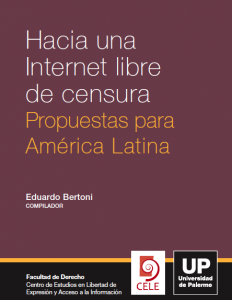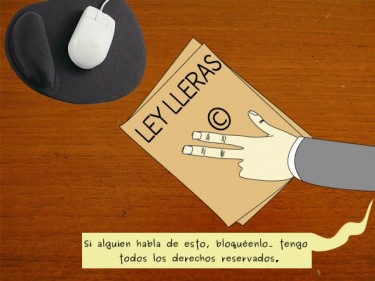Last week, the Center for the Study of Free Expression (CELE) at Argentina’s University of Palermo released Towards an Internet free of Censorship: Proposals for Latin America [Hacía una Internet libre de censura: Propuestas para América Latina] [es]. With contributions by leading policy experts from Brazil, Chile, Colombia, Puerto Rico, and the U.S., the book addresses some of the most pressing challenges facing Latin American digital rights advocates today.
Drawing on current debates in five of the region’s strongest economies—Argentina, Brazil, Chile, Colombia, and Mexico—all of which boast high Internet penetration rates for Latin America, contributors provide a sketch of legislation, judicial decisions, and policies that affect free expression and privacy online. Book editor and CELE Executive Director Eduardo Bertoni writes:
El debate global sobre la regulación en Internet ha evolucionado desde aquella pregunta inicial acerca de si es necesaria y deseable alguna regulación en la red. […] Los artículos de esta publicación abordan [estos temas] no con la idea de arribar a soluciones últimas, sino con la intención de plantear algunas de las cuestiones legales involucradas en estos temas y pensar el efecto que pueden tener estas políticas sobre la libertad de expresión.
The book’s authors urge policymakers to rely on international and regional human rights instruments—the Universal Declaration of Human Rights, the International Covenant on Civil and Political Rights, and the American Convention on Human Rights—as crucial sources of guiding principles in making policy for the digital age.
Underlying much of the analysis and discussion in the text are three fundamental questions:
- When Internet users post content, store personal data, and search for information on the web, what are their rights and responsibilities?
- How can governments protect citizens’ rights to privacy and free expression while still upholding defamation and copyright law and ensuring that law enforcement officials can carry out legitimate criminal investigations online?
- What role do Internet intermediaries—ISPs, search engines, or platforms for user-generated content, such as YouTube or WordPress—have in implementing government policy?
Numerous debates surrounding Internet regulation in Latin America focus on copyright violations and threats to honor or reputation (also known as defamation). Many courts in the region take these infractions seriously (both on and offline), and some legislators argue that they justify implementing tighter regulations on Internet activity.
In Colombia, the proposed (though currently shelved) Lleras Law would allow copyright holders to demand that Internet Service Providers (ISPs) remove infringing content from the web, a process known as “notice-and-takedown.” Under current Colombian law, ISPs can only be required to remove content if they receive an order from a judge. But Ley Lleras would eliminate this requirement, leaving ISPs with the burden of determining whether or not takedown requests were valid.
Internet search engines also have been held liable for providing access to defamatory content. In Argentina, singer Virginia da Cunha filed a defamation suit against both Google and Yahoo! Argentina, after the companies had denied da Cunha’s request that they filter (remove) search results for her name that led to sexually explicit content. A judge initially ruled in the singer’s favor, but an appellate court later overturned the decision.
Contributing authors Claudio Ruiz [es] and Juan Carlos Lara, of the Chilean NGO Derechos Digitales, warn that under the Lleras Law, ISPs likely would comply with most takedown requests before fully considering their validity, as the alternative could leave them vulnerable to prosecution. The da Cunha case could have led to a similar result, where search engines would agree to filter results upon request, so as not to risk punishment. These examples illustrate the need to protect intermediaries from liability for content created by their users.
Brazilian legal scholar Joana Varon and her co-authors, all researchers at the Centro do Tecnologia e Sociedade, discuss these issues in a chapter on content filtering. Although there is little evidence that Latin American governments (with the exceptions of Cuba and Venezuela) engage in widespread filtering, legislators have considered various filtering mandates that would combat copyright violations and defamation online. But the authors note that there is a problem with this approach:
…técnicas de filtrado no son precisas…es casi imposible bloquear solo un determinado contenido sin afectar otros…[A]demás, muchos de esos mecanismos utilizados para regular y censurar información son cada vez más sofisticados, utilizando…muchas camadas de control que generalmente están escondidas del usuario común, quien probablemente ni se dará cuenta de que la información a la que accede ha sido objeto de filtrado.
Other contributors include Universidad de los Andes scholar Lorenzo Villegas, who describes the challenges of protecting personal data in the digital age, and Eduardo Bertoni, who discusses the issue of jurisdiction in defamation cases where the poster of the defamatory content is located in one jurisdiction and the offended party is in another. Towards an Internet free of censorship also features articles by George Washington University Professor of Law Dawn Nunziato, Derechos Digitales’ Alberto Cerda, and University of Puerto Rico legal scholar Hiram Meléndez Juarbe.
The Center for Democracy & Technology's Cynthia M. Wong, James X. Dempsey, and Ellery Roberts Biddle co-authored the final chapter of the book, which places current policymaking debates in Latin America into broader international context. They note that the issues being debated in Latin America are very similar to those raised elsewhere in the world, a convergence that is not surprising given the global nature of the medium.
However, while policymakers around the world are confronting the issues of free expression, privacy, copyright protection, defamation, and government power, approaches vary substantially from region to region, and country to country. Some have turned towards repression, jeopardizing not only human rights but also economic innovation and human development. As the book shows, Latin American policymakers have looked to both Europe and the U.S. when debating these issues. But they also have the unique advantage of working in a region where country-to-country relations are generally friendly, and legislators often are able to “borrow” policy solutions from one country and apply them in another.
Towards an Internet free of censorship aims to take advantage of this cooperative dynamic by initiating new conversations, collaborations, and policy initiatives that will help to protect and strengthen online free expression, freedom of information, and privacy throughout Latin America.






4 comments